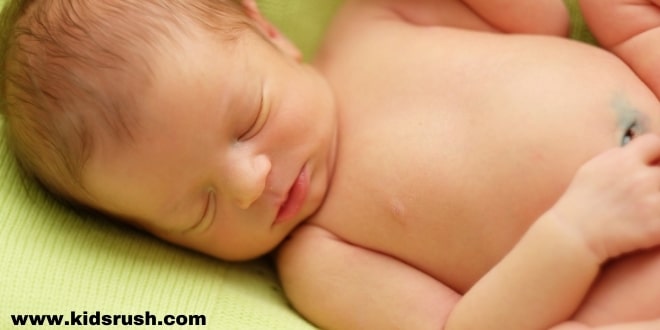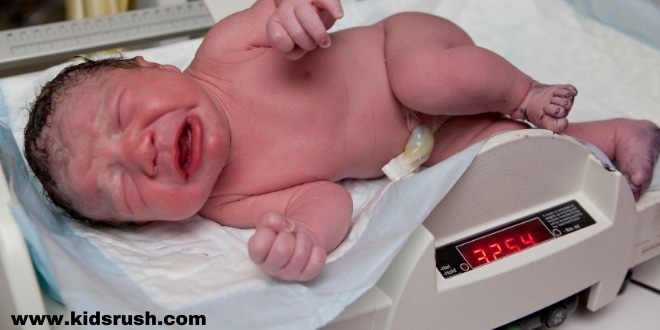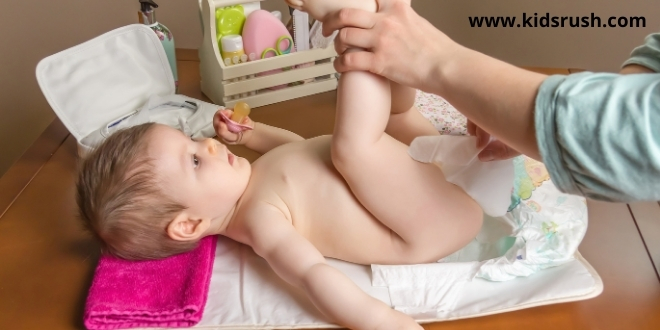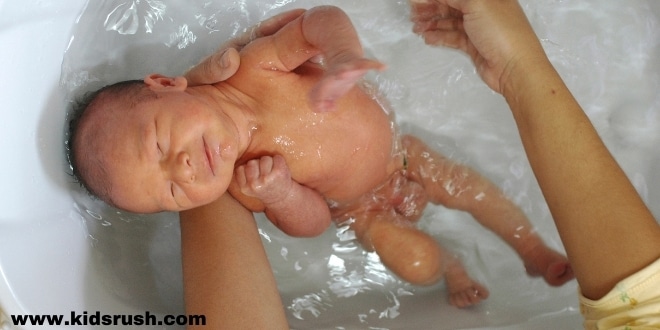This first week of the baby’s life will be very intense: coming home with a newborn is an incredible experience, so take a breath… and get ready for a few days when each day will be a new surprise!
The first week of a newborn’s life
How does your baby grow?

During this week, all your baby’s efforts to grow will be oriented in one direction: gaining weight. However, during the first week of the baby, you will notice that he is actually losing weight: this is normal: do not worry! In the first few days, a baby can lose up to 10% of his birth weight, since he is eliminating excess fluids from pregnancy. Little by little he will recover and, around the second week, he will probably weigh the same as at birth.
You may have already noticed that, after delivery, the typical question is how tall and how heavy is the newborn, right? This information is very important even for pediatricians because it helps to know if the baby is an adequate size. Now: what is the normal size of a baby at birth? There is no single answer to this question: it will depend on many factors, from genetics to the habits you followed during pregnancy.
The ideal weight of a newborn

As a standard measure, pediatricians consider that a baby has a normal weight if it is between 2.5 and 4 kg at birth. There are some reference values, known as percentiles, that serve to compare the size and weight of the baby and relate it to the ideal standards for his age: your pediatrician will use these tables to determine if your baby was born with good development. And, if you want, you can also calculate it yourself on our website!
This information is very important because a weight less than 2.5 kg may indicate that it is necessary to carry out more exhaustive monitoring to avoid possible risks in its growth and maturation; Besides, too low a weight can lead to small or small developing diseases or infections during the days after birth. Of course, this depends on each child, so before getting alarmed, we will always consult our pediatrician: standards are useful information, but each baby develops at their own pace. [1]
Skills and development of the one-week-old baby
In this first week of life, your baby will learn to put in place all the mechanisms necessary to survive outside the uterus: control breathing, begin to digest and develop its own intestinal flora, learn to suck, develop a smell, and the sense of touch …
You will likely detect some moments when it seems that your baby has stopped breathing: this happens, and you should not worry. Newborn babies have apnea episodes that overlap with irregular breathing – don’t panic! You just have to watch that these episodes are decreasing and that the breathing is acquiring a more regular pattern as the days go by.
Your baby can begin to focus his vision on objects or people that are about 40 centimeters away, that is, the approximate distance from your face while you breastfeed.
You can smile sometime between the first and the tenth week of life. It is a reflex smile that is very different from the social smile, which occurs in response to something else (like hearing yourself sing, for example).
His body moves similarly. If you notice that one side of the body moves more than the other, you should consult your pediatrician to rule out that your baby hurts something or has an inadvertent injury.
Any given day …
As he adjusts to his new life outside the womb, your newborn baby will spend many hours a day sleeping – 16-18 a day. In these first days, he will not have an established sleep pattern, so you will likely feel that you spend the day changing his diaper and breastfeeding in a somewhat chaotic way. It’s perfectly normal – just relax and enjoy the moment! As the days go by, you can begin to establish a more defined routine.
Even if your baby sleeps many hours, try to watch that he wakes up to eat and that he has certain moments of activity. If you feel very lethargic or detect any abnormal symptoms, such as a fever or a temperature that is higher than usual, consult your pediatrician.
Within your basic toolkit, you will need:
- A pillow for breastfeeding.
- A monitor to listen to your baby when you are not with him or her.
- A sofa.
Basic care of your one-week-old baby

This first week is very intense: you will live first moments with your baby in every way, and you have to learn to do some things quickly. It is logical that at some point you feel a bit overwhelmed, but don’t worry: it happens to everyone. These days, one of the things you should learn is when and how to help your baby to breathe out by burping, to avoid discomfort and accumulation of gases in his tummy.
Each person who visits you will likely give you different advice, but the truth is that each baby is a world, and no one better than you will know what they need. For some babies it is good to get the air out during the feeding; others regurgitate and it is better to wait for them to finish. If you are breastfeeding, he may not even burp because, unlike bottle-fed babies, he does not swallow as much air. Listen to your instincts, watch your baby’s cues, and go testing until you find a routine in which both of you are comfortable.
Diapers and your baby

If there is something that you will quickly get into practice with, it is with diaper changes: newborn babies can urinate up to 20 times a day and defecate an average of 4 times, so if you are a bit rushed at first, don’t worry. worry: you will do it right away with your eyes closed! The first two or three days your baby will expel a viscous substance whose color varies between dark green and black: it is meconium, a mixture of various elements that accumulate in the intestine during pregnancy and delivery. From the third day, you will see that your baby’s poop progresses towards a more yellowish tone and its texture becomes lumpier.
A very common question with the first baby is how often to change the diaper. There is no single answer, but consider that the less time the newborn’s skin is in contact with urine or feces, the lower the risk of infections, dermatitis, and so on.
The best thing is that you choose certain key moments in which to change your baby’s diaper more or less systematically. A good time may be right after feedings since most babies tend to urinate during the suck.
The first bath

In this first week of the baby, it is also time for the first bath. The vast majority of babies love water, so maintaining a daily bath routine is perfect for relaxing your baby and creating an optimal environment before bed. However, we recommend that the bathroom is not the first thing you do when you get home. You will notice that your baby’s skin is covered in a whitish and somewhat sticky substance: this substance called vernix caseosa is made up of fat, protein, and water and serves to protect the baby’s delicate skin during pregnancy.
After delivery, it helps you keep your temperature constant and protects you from possible infections. During the first days of life, this substance will be reabsorbed little by little, so even if you are tempted to bathe your little one, don’t do it! Vernix also prevents rubbing on clothing or a diaper from causing injuries or irritations. Little by little you will see how it disappears and, in a few days, you will be able to start bathing the newborn.
In these first days, we recommend that you use a bathtub that does not completely cover the baby: keep his abdomen dry and you will help the umbilical cord to dry more quickly and fall faster.
Until not long ago it was recommended to clean the cord with antiseptic or alcohol, but the most recent studies show that this not only does not reduce the probability of having an infection but also delays the fall of the cord. So in this case, the best thing you can do for your baby is nothing! Stick with sponge baths and keep that area as dry as possible.
The first visit to the pediatrician

The first visit to the pediatrician usually takes up to 15 days from birth, but we recommend that you do it during the first week of your baby’s life.
You can check if your baby is regaining the weight he lost after birth. Sometimes mothers have problems establishing breastfeeding for various reasons: the baby does not know how to grasp the nipple correctly, the milk does not rise … A visit to the pediatrician can quickly detect this and offer you solutions that not only improve the nutritional status of your child but avoid problems for you like mastitis or cracks in the breast.
The sooner you go to the pediatrician, the sooner the second heel test can be done, which allows the specialist to rule out some rare diseases or, if applicable, establish an effective treatment as soon as possible.
The pediatrician may continue to monitor the cranial perimeter. At birth, the skull bones are not closed yet: it is important to monitor that they develop correctly to avoid injury. In the same way, a head that is too small or too large can indicate different alterations that must be detected as soon as possible.
Feeding

During the first day or two of life, your baby may seem to be much more interested in sleeping than eating. This is normal, as labor is also tiring for the baby: let him rest and make sure he eats enough; the stools will serve as a guide to detect if it is sufficiently hydrated or hydrated; As a general rule, whether or not he demands to eat, you should give him a drink every 3 or 4 hours. Even so, each baby is different, so let your instincts guide you a bit during the first 24 hours.
The first feedings will be of colostrum: it is a substance much thicker than milk and it contains a huge amount of nutrients to keep the baby well fed until normal milk begins to flow. From the third or fourth day, your breasts will begin to secrete milk instead of colostrum and the amount generated will increase progressively. Around day 11 you will have a perfectly established lactation.
A healthy baby needs between 8 and 12 feedings a day. This can vary depending on the quality of your breast milk or if you give it formula. The duration of each feeding is also variable and here, besides, the ability of the baby to suck comes into play: as he takes practice and learns to do it more efficiently, the feedings can be reduced from 45 to 15 or 20 minutes.
Read Also: 5 Important Tips for Breastfeeding While Pregnant
Breastfeeding may be difficult and a bit stressful for you at first. If so, feel free to seek help and consult your doctor, midwife, or even a lactation expert for advice on how to help your baby latch onto the breast, which postures are best for you, and so on.
The most common position is the one in which your belly and your babies are in contact; With the baby lying on your forearm, bring him closer to the breast so that the nipple is more or less at the level of his nose. He or she should have a suck and latch reflex; To ensure proper feeding, you should have the nipple and a small part of the areola in your mouth.
A piece of very common advice is that you should give the baby milk from both breasts, to prevent it from accumulating. This is correct, but with some nuances: the milk that the baby takes is very different at the beginning, in the middle, and at the end of the feeding. The final milk is much richer in fat, has more nutrients, and is more satiating: ideally, you should let one breast empty before moving on to the other to take advantage of this more nutritious milk.
It is likely, even so, that the first few days you only want to take from one breast because you will already be satiated or satiated with this fattier milk. If this happens, you should start the feed with the other breast: if you emptied the left, the next feed will have to be from the right.
Read Also: Breastfeeding after cesarean delivery
Dream
During its first week of life, your baby will spend many hours sleeping. But, unfortunately, not all at once so you can rest: it will wake up and go back to sleep many times throughout the day. It’s normal – you’re still getting used to life outside the womb. Here are some tricks that will help you fall asleep more easily.
First of all, remember that a newborn should always sleep on his back: this will prevent him from drowning and, also, different studies suggest that this helps prevent sudden death, a condition that occurs with a probability of 0.5 cases per every 1000 babies born in Spain; You should also avoid having objects in the crib, be it toys or stuffed animals like even a pillow.
In the first days, it will help you a lot to fall asleep to have a small basket, where the baby sits wrapped and gathered. Even so, their sleep hours will be quite irregular and they will wake you up many times during the night: try to get your partner or a family member to help you if you feel too tired or if you can’t fall asleep for a few days.
This week the mother …
Likely, in these first days, you do not want to be aware of anything other than your baby, however, it is highly recommended that you try to take some time to take care of yourself, breathe and relax: the first week with a newborn is wonderful, But if you’re not looking for the time to take a little break, it can also be exhausting.
In your kit for the first days as a mom you can include:
- Toxicological compresses. Postpartum bleeding is usually very profuse. Try to change frequently to avoid possible infections at the episiotomy.
- Disposable briefs. They will be very useful together with the toxicological compresses.
- Sterile gauze pads to dry off after showering. They are more recommended than towels because you do not run the risk of fibers sticking to the points.
Whether you have had natural childbirth or if you have had a cesarean section, follow these same steps so that the wound heals well: wash with your hand with a mild soap, pat dry with gauze and make sure that the clothes do not rub the wound. After 10 days, the midwife will remove the stitches and you can start applying the cream to the scar so that your skin recovers properly.
Make sure you get all you need rest, hydrate yourself well, and watch your diet. Childbirth is exhausting and your body has to recover well from the enormous effort involved. And, even if you have the feeling that there are a thousand things to do and to learn, always keep in mind that this first week is unique and unrepeatable: enjoy it to the fullest, try to relax, and do not worry about not being the perfect mother from the first minute. You have your whole life ahead of it
